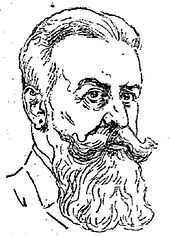Eugen Steinach

Eugen Steinach (January 28, 1861 – May 14, 1944) was a leading Austrian physiologist and pioneer in endocrinology.
Life and career
He was born on January 28, 1861, in Austria.[1]
Steinach was a physiologist, hormone researcher and biology professor who became the Director of Vienna’s Biological Institute of the Academy of Sciences in 1912, the year in which he conducted experiments in the transplantation of a male guinea pig's testes into a female and the castration of the male.[2] The testes secretion, now known as testosterone, resulted in the female guinea pig developing male sexual behavior such as mounting the partner. This led Steinach to theorize that the gland's secretions were responsible for sexuality.[3]
He developed the "Steinach operation," or "Steinach vasoligature," the goals of which were to reduce fatigue and the consequences of aging and to increase overall vigor and sexual potency in men. It consisted of a half-(unilateral) vasectomy, which Steinach theorized would shift the balance from sperm production toward increased hormone production in the affected testicle.[4][5]
Famous Steinach surgeons in the 1920s and 1930s included Victor Blum, Robert Lichtenstern and Norman Haire. William Butler Yeats had an outburst of lyrical poetry and a 'second puberty' after Haire 'Steinached' him on 6 April 1934.[6] The procedure was later discredited, but even at the peak of its popularity there were medical sceptics such as Morris Fishbein, who edited the Journal of the American Medical Association and in 1927 likened rejuvenation cures to finding gold: once the ‘cry of “gold, gold” was taken up by Steinach enthusiasts’ and famous actors, physicians, and financiers had the operations, the newspapers reported their good news stories and there was an additional rush of applicants.[7] Steinach received six nominations for the Nobel Prize in Physiology from 1921 to 1938 although he was never to receive it.[8]
He died on May 14, 1944, during exile in Switzerland.[9] Henry Benjamin, in a June 1944 obituary for his colleague, attributed the melancholy of his final years to his enforced exile in Zurich and the ‘unjust criticism’ of his rejuvenations and emphasised the ‘enormous impetus’ his work had for biochemists to concern themselves with all the endocrine glands.[10]
References
- ↑ "Dr. Steinach, 81 Today, Works On New Serum. Hormone Expert's Studies Said to Relate to Bone Structure". New York Times. January 28, 1942. Retrieved 2010-08-02.
Dr. Eugen Steinach, celebrated Austrian physician and discoverer of the function of the hormone in the 'reactivization' of the human body, will celebrate his eighty-first birthday here tomorrow 'still feeling spiritually many years less than my mathematical age.'
- ↑ Eugen Steinach (1940) Sex and Life: Forty Years of Biological and Medical Experiments. (New York: Viking Press), p. 66
- ↑ Steinach (1940), p. 8
- ↑ "Medicine: What Am I Doing?". Time magazine. February 12, 1940. Retrieved 2010-08-02.
Hence he conceived the idea of stimulating hormone flow by damming up the "antagonistic" seminal canals. This he did by ligating (tying off) and severing the main duct of the canals, known as the vas deferens. This "Steinach vasoligature" is a simple operation, takes only 20 minutes.
- ↑ Christopher Turner (Spring 2008). "Vasectomania, and Other Cures for Sloth". Cabinet Magazine. Retrieved 2012-06-21.
- ↑ Wyndham (2012), pp. 245–263
- ↑ Diana Wyndham. (2012) "'Norman Haire and the Study of Sex'". Foreword by the Hon. Michael Kirby AC CMG. (Sydney: "Sydney University Press)"., p. 92
- ↑ {Chandak Sengoopta (2000), 'The Modern Ovary: Construction, Meanings, Uses', History of Science, 38 (Pt 4) (122), p. 456 |url=https://www.academia.edu/192187/_The_Modern_Ovary_Constructions_Meanings_Uses_}
- ↑ "Dr. Eugen Steinach". New York Times. May 16, 1944. Retrieved 2010-08-02.
Among those who made his contribution to our knowledge of their function was Dr. Eugen Steinach, who died on Sunday. an exile from his native Austria. ...
- ↑ Wyndham (2012), p. 90, quoting Harry Benjamin
|